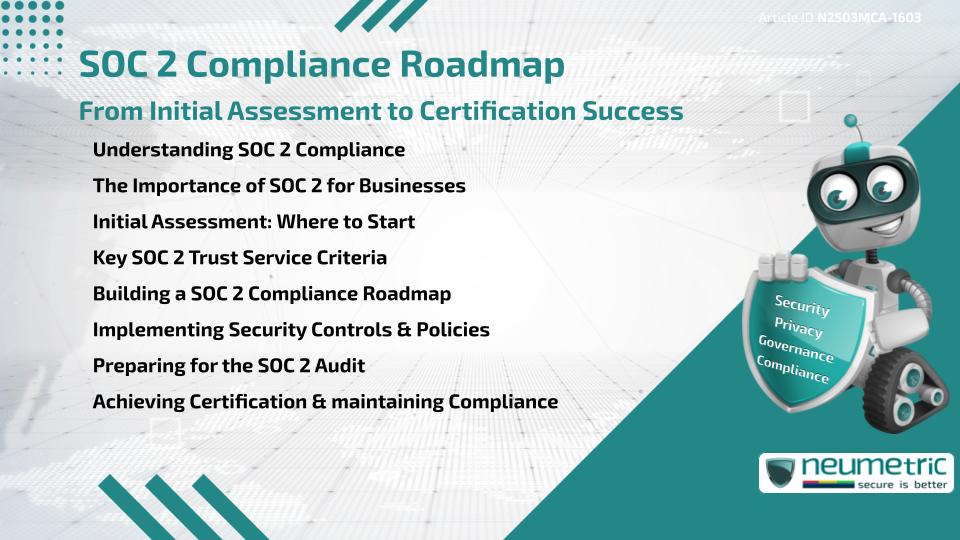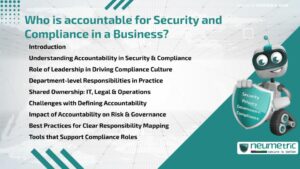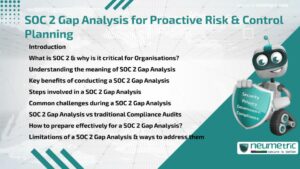Table of Contents
ToggleIntroduction
Businesses handling Sensitive Data must ensure their Security Measures meet Industry Standards. One of the most recognized Frameworks for Data Protection & Operational Security is SOC 2. This article provides a step-by-step SOC 2 Compliance Roadmap to help Organisations navigate from Initial Assessment to Certification Success.
Understanding SOC 2 Compliance
SOC 2 is a Framework developed by the American Institute of Certified Public Accountants [AICPA] to assess an Organisation’s Security, Availability, Processing Integrity, Confidentiality & Privacy of Customer Data. Unlike other Security Standards, SOC 2 Reports focus on Internal Controls tailored to each Business’s unique operations.
The Importance of SOC 2 for Businesses
SOC 2 Compliance reassures Clients & Stakeholders that an Organisation follows Best Practices in Data Protection. It helps Businesses build Trust, meet Contractual Obligations & maintain a Competitive Advantage. Without SOC 2 Certification, Companies may struggle to establish Credibility in Industries that prioritise Security.
Initial Assessment: Where to Start?
The first step in the SOC 2 Compliance Roadmap is an Initial Assessment. Businesses should evaluate their existing Security Posture by conducting a Gap Audit. This helps identify weaknesses in current Controls & outlines areas that require improvement. Companies must also define their Audit Scope by selecting the relevant Trust Service Criteria [TSC].
Key SOC 2 Trust Service Criteria
SOC 2 Compliance revolves around five (5) TSC:
- Security: Protects Systems & Data from Unauthorized Access.
- Availability: Ensures Services are operational & meet Performance Commitments.
- Processing Integrity: Verifies that Systems process Data accurately & reliably.
- Confidentiality: Protects sensitive Business & Customer Information.
- Privacy: Manages Personal Data according to relevant Privacy Policies & Regulations.
Building a SOC 2 Compliance Roadmap
Developing a structured SOC 2 Compliance Roadmap involves:
- Defining Objectives: Understanding why Compliance is necessary.
- Identifying Gaps: Assessing current Security Practices.
- Developing Policies: Establishing Security Controls aligned with TSC.
- Implementing Changes: Addressing Gaps through Procedural Updates.
- Preparing for the Audit: Ensuring readiness for Third-Party Evaluation.
Implementing Security Controls & Policies
Organisations must implement Security Controls to meet SOC 2 Requirements. This includes:
- Access Controls to restrict Unauthorized Data Access.
- Encryption measures for Data Protection.
- Incident Response plans to manage Security Breaches.
- Continuous Monitoring to detect & mitigate Risks.
These Controls should be documented in Security Policies & communicated across Teams to ensure Compliance.
Preparing for the SOC 2 Audit
Once Controls are in place, Businesses should conduct a Readiness Assessment. This involves Internal Audits, Documentation Review & Employee Training. Engaging a Third-Party SOC 2 Auditor is essential for obtaining an official SOC 2 Report. The Audit process typically includes Evidence Collection, Control Testing & Management Reviews.
Achieving Certification & maintaining Compliance
Upon successful Audit completion, Businesses receive a SOC 2 Report demonstrating Compliance. However, Compliance does not end with Certification. Organisations must:
- Conduct regular Risk Assessments.
- Update Security Policies based on evolving Threats.
- Maintain Continuous Monitoring & Logging mechanisms.
- Train Employees on Security Best Practices.
Long-term Compliance requires ongoing commitment to Security Improvements & Periodic Audits.
Takeaways
- SOC 2 Compliance ensures businesses maintain high security & Operational standards.
- A structured SOC 2 Compliance Roadmap simplifies the Certification Process.
- Implementing robust Security Controls & Policies is crucial for Audit success.
- Continuous Monitoring & periodic Audits help maintain Compliance.
- Achieving SOC 2 Certification enhances Business Credibility & Trust.
FAQ
What is a SOC 2 Compliance Roadmap?
A SOC 2 Compliance Roadmap is a step-by-step Plan that guides Businesses from Initial Assessment to Certification by implementing Security Controls & Policies.
How long does it take to achieve SOC 2 Compliance?
The timeline varies depending on an Organisation’s Security Posture, but it typically takes between six (6) months & one (1) year to complete the SOC 2 Compliance process.
What are the five Trust Service Criteria in SOC 2 Compliance?
The five (5) Trust Service Criteria include Security, Availability, Processing Integrity, Confidentiality & Privacy. These principles ensure comprehensive Data Protection & System Reliability.
Is SOC 2 Compliance mandatory?
SOC 2 Compliance is not legally required, but it is often a contractual obligation for Businesses handling sensitive Customer Data, especially in industries like SaaS & Finance.
What happens if a Company fails a SOC 2 Audit?
If a Company fails a SOC 2 Audit, the Auditor provides a Report outlining areas of Non-Compliance. The Organisation must address these Gaps before undergoing another Assessment.
How often should businesses renew SOC 2 Certification?
SOC 2 Reports are valid for one (1) year & Organisations should undergo Annual Audits to maintain Compliance & demonstrate ongoing Security Commitments.
Can Small Businesses benefit from SOC 2 Compliance?
Yes, Small Businesses can benefit by enhancing Data Security, gaining Customer trust & improving Business Credibility with SOC 2 Compliance.
What is the difference between SOC 2 Type 1 & Type 2 Reports?
SOC 2 Type 1 evaluates Controls at a specific point in time, while SOC 2 Type 2 assesses Control Effectiveness over a period, typically three (3) to twelve (12) months.
Do all Businesses need an external SOC 2 auditor?
Yes, a Third-Party Auditor is required to conduct a formal SOC 2 Audit & issue a Compliance Report.
Need help?
Neumetric provides organisations the necessary help to achieve their Cybersecurity, Compliance, Governance, Privacy, Certifications & Pentesting goals.
Organisations & Businesses, specifically those which provide SaaS & AI Solutions, usually need a Cybersecurity Partner for meeting & maintaining the ongoing Security & Privacy needs & requirements of their Clients & Customers.
SOC 2, ISO 27001, ISO 42001, NIST, HIPAA, HECVAT, EU GDPR are some of the Frameworks that are served by Fusion – a centralised, automated, AI-enabled SaaS Solution created & managed by Neumetric.
Reach out to us!





